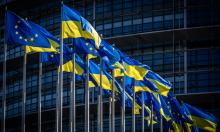Is Greece on the Edge of Volcano Catastrophe? - 29 January, 2003 - News
Volcanic activities are gathering steam in the Mediterranean area
There is no need to prove the fact that Greece is the area of seismic activity. This is a widely-known fact. Such proofs appear themselves in the form of regular earthquakes. It would be an exaggeration to say that the Greek people are used to them. A message has recently arrived from the island of Nisiros in the Aegean Sea: a volcano is awakening there. Will Greece suffer from the tragedy, which happened in Italy at the end of the last year?
No one will ever get used to shaking ground, peeling plaster, cracking walls. No one will ever get used to the feeling of helplessness in the face of the natural disaster and its abruptness. Every resident of Greek capital Athens remembers the horrid earthquake, which happened in the country in 1999. At first, there was something roaring, as if a lot of big planes were flying above the city. The roar was growing louder and louder, which ended up in a blow and the earthquake. The animal fear, weakness, headache and ringing in ears. What was that? A hand grabs a remote control, fingers press button after button, trying to find a channel, which could give an explanation of what was going on. Phones stop ringing. People hurry to pick up their documents and money and run out of their houses. Some of them run back in, although the earthquake continues. Television channels broadcast the information, which says that no one was killed. The situation gets absolutely different just 15 minutes later. The number of victims grows every hour. An American TV channel reported that the earthquake measured seven on Richter scale. It is time to announce the state of emergency and to acknowledge the earthquake the national tragedy. However, Greek seismologists (they are funded by the government) reported that the shock power was a lot lower – 5.8-5.9. Six points are the minimum to announce an earthquake a natural tragedy. In other words, it means that the government will not compensate the complete damage to build new houses. Humanitarian help and trailers will do.
People will be spending several nights outside, waiting for another shock to happen. When it is all over, people will be afraid of the slightest vibration for a year. Any piece of news about an earthquake is like the brief information from the front: how many people died and where, the level of destruction and so forth.
Another disturbing message came from Italy – about the eruption of Mount Etna in Sicily. The eruption started in the fall. It has recently started fading. This story is worth paying special attention to, for something like that might happen in Greece as well.
The eruption of Mount Etna volcano in Sicily was accompanied with underground shocks. Twenty-nine people were killed (26 children among them) and 65 people were seriously wounded as a result of the disaster. The town of San-Juliano was leveled with a very strong quake back in 1566. There are 1195 people living in that settlement nowadays. The town is situated 460 meters above the sea level. The majority of the killed people were children that died under the ruins of their school. More than 30 people were saved. Italian President Carlo Azeglio Ciampi presented his condolences to those, who suffered from the tragedy. This was the result of the Etna-caused quake.
The eruption caused huge damage to the economy, tourist activities and agriculture of the region, where the town is situated. Big black could of ashes could be seen above Mount Etna for a long time. Local airport was shut down. Hundreds of families that live close to the site of the eruption were evacuated. The eruption started fading away, although scientists say that another Italian volcano might blow up – Stromboli, which is located on the island of the same name, to the north off Sicily. Stromboli, as well as Europe’s largest volcano Etna, are situated in the area of the geological split between the European and African continents. Franco Barberi, a well-known volcanologist, believes that there is a connection between powerful quakes in the south of Italy and Stromboli’s activity. Some scientists forecast the eruption of Vesuvius volcano, not far from Naples. This volcano has been silent for more than 50 years.
The volcanic ashes of Mount Etna’s eruption was found in Malta, in Libya. It was hard to breathe in Athens at that time as well, one could smell carbonic acid in the air. Fountains of lava 200 meters high erupted from Stromboli’s three craters in the middle of October. Groundwas shaking in the villages at the foot of the mountain. Scientists’ suspicion turned out to be true in the beginning of December. Stromboli woke up. Ancient Greeks, who witnessed Etna’s early eruptions, ascribed those horrible events to Zeus. They thought that it was an the expression of his anger. Another mythological version says that Mount Etna is the workshop of Hephaestus, the Greek god of fire. Another myth says that Zeus put a dragon inside Mount Etna, whose roar produces lava flows.
A chain of earthquakes moved from Italy to Greece. Quakes happened near the islands of the Ionian Sea, then in the western coast, and then in Athens. It should be mentioned that the chain of quakes was of the fading character, so the quake in Athens was very weak. Last week there was a message, which said that the volcano in the island of Nisiros in the Aegean Sea.The temperature of thermal waters went higher, volcanic cracks became larger. The largest crack in the foot of the mountain became three times as larger.
Greece is well-acquainted with catastrophic eruptions. The Guinness Book of Records has the following categories: “Natural Phenomena,” “Volcanoes.” The most powerful volcanic blast happened on August 1883 at 10 a.m. local time, when Krakatau volcano blasted in Sunda Strait, between the islands of Java and Sumatra, Indonesia. The tidal wave that was caused with the blast of the mountain washed away 163 villages, which killed 36380 people. Big pieces of lava were blasted in the air at the height of 55 kilometers. The volcanic ashes fell down 5330 kilometers far from the volcano ten days later. Another volcanic explosion was registered four hours later on the island of Rodriges, which is 4776 kilometers far from Krakatau. Its roar could be heard on eight percent of the global territory. Krakatau’s explosion was 26 times as stronger as the most powerful H-bomb that was tested by the USSR. However, that explosion was three times as weak in comparison with the eruption of Santorini volcano.
Scientists paid attention to the Santorini catastrophe quiet recently. The volcano is incredibly huge: the caldera diameter is 14 kilometers, so it seemed to be impossible. The blast of the volcano took place in the year 1400 B.C. The eruption ended up with a caldera of 83 square kilometers. The layer of volcanic sediment is up to 65 meters thick at the foot of the mountain. That layer is five meters thick 30 kilometers far from the mountain. The volcano blasted 72 cubic meters of lava and ashes. The territory, which was covered with volcanic ashes, was 200 000 square kilometers. The eruption was accompanied with monstrous tsunamis. Myths say (scientists have recently determined that it was true) that a giant tsunami covered the island of Crete over. Tsunami was 250 meters high 20 kilometers far from Santorini.
Some scientists believe that Atlantis was destroyed on account of that eruption. The island-based empire sank within 24 hours. Atlantis will always remain a legend, although there were a lot of Mediterranean islands that stopped their existence after that. Ancient maps prove that. Cyprus used to be a peninsula, it was linked to the southern coast.
There are a lot of Biblical stories that are based on the disastrous eruption of Santorini volcano. One of them is the story about the Egyptian darkness. The concentration of volcanic ashes and gases was very high in the air after the eruption. The sunlight was cut off from Egypt and from the eastern part of the Mediterranean Sea for several days. This is how the Bible writes about it: “And the LORD said unto Moses, Stretch out thine hand toward heaven, that there may be darkness over the land of Egypt, even darkness which may be felt. And Moses stretched forth his hand toward heaven; and there was a thick darkness in all the land of Egypt three days: They saw not one another, neither rose any from his place for three days: but all the children of Israel had light in their dwellings.” (Exodus, 10.21-23).
It is worth mentioning that the island of Nisiros, where the volcano awakened, is not really far from Santorini. We planned to finish this article with an opinion from seismologist Christopher Metax, but we did not get to find him in Athens. He and a group of scientists left for Nisiros to study the situation there.
On the photo: The view of Mount Etna from space
Sokrat Grammatikopulos Athens Messenger Newspaper Athens
Translated by Dmitry Sudakov
Subscribe to Pravda.Ru Telegram channel, Facebook, RSS!





